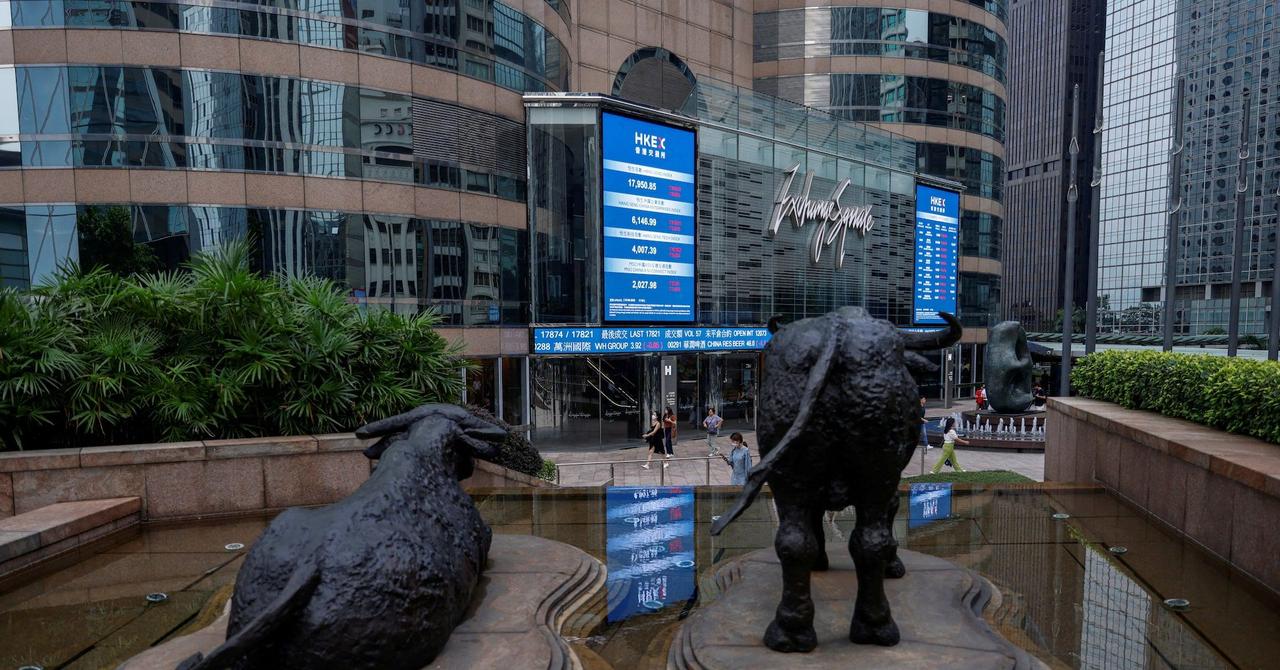Sovereign Wealth Funds Shift to Active Management and Chinese Tech Investments Amid Global Volatility
2 Sources
2 Sources
[1]
Wealth funds warm to active management - and China - to weather volatility, report shows
LONDON, July 14 (Reuters) - The world's sovereign wealth funds are turning to active fund management and investments in China, while central banks are diversifying reserves to weather a volatile global environment, an Invesco survey of sovereign funds and central banks managing $27 trillion in assets showed. Still, the dollar reigns supreme, with the bulk of central banks saying it would take two decades to dethrone it - if ever - as the top reserve currency despite growing concerns. "Institutions with greater than $100 billion - so the pretty large institutions - those are the ones that were most interested in moving more to active management," said Rod Ringrow, Invesco's head of official institutions. Whereas funds liked passive management in predictable market conditions, predictable was "no longer the case," he added. "I think that frames the whole approach... in this move to active management." On average, wealth funds made returns of 9.4% last year, the joint second-best performance in the survey's history. Nevertheless, market volatility and de-globalisation concerns have spiked - and over the 10-year horizon, big worries centre around climate change and rising sovereign debt levels. Over 70% of the 58 central banks polled for example now believe rising U.S. debt is negatively impacting the dollar's long-term outlook. Nevertheless, 78% think it will take more than two decades for a credible alternative to the greenback to emerge. That is a jump from 58% last year while just 11% of central banks now view the euro as gaining ground compared to 20% last year. CHINA FOMO The survey was carried out between January and March - before U.S. President Donald Trump's "Liberation Day" tariff announcements and at the peak of excitement around DeepSeek AI's emergence in China. Wealth funds are seeing a major resurgence in interest in Chinese assets with nearly 60% intending to increase allocations there in the coming five years, specifically the tech sector. That number jumps to 73% in North America despite the worsening U.S.-Sino tensions, whereas in Europe it sits at just 13%. Wealth funds, the survey said, were now approaching China's innovation-driven sectors with the "strategic urgency they once directed toward Silicon Valley." "There's a little bit of a FOMO," Ringrow explained, a view that "I need to be in China now" as it shapes up to be a global leader in semiconductors, cloud computing, artificial intelligence, electric vehicles and renewable energy. Private credit has also emerged as a key focus for funds seeking alternative sources of income and resilience. It is now adopted by 73% of wealth funds, up from 65% last year, and with half actively increasing allocations. "This represents one of the most decisive trends in sovereign asset allocation," the report said. There is also growing interest, especially among emerging market wealth funds, in stablecoins - a type of cryptocurrency that is most commonly pegged 1:1 to the dollar. Almost half of funds said stablecoins were the type of digital assets they were inclined to invest in, although that was still behind the likes of bitcoin, where the share was 75%. Reporting by Libby George; Editing by Hugh Lawson Our Standards: The Thomson Reuters Trust Principles., opens new tab * Suggested Topics: * Funds Libby George Thomson Reuters Libby George is a London-based journalist on the Reuters emerging markets team. She was part of a team named as Pulitzer finalists in 2023, and who won the Selden Ring Award for International Investigative Reporting, for a series of stories revealing abuses by Nigeria's military. After launching her career as a political journalist in Washington, D.C., she joined Reuters in 2015 covering oil, and from 2019-2023, she was senior correspondent and acting bureau chief based in Lagos, Nigeria. Marc Jones Thomson Reuters Marc Jones is a senior global markets correspondent based in London with a focus on economics, central banks, policymakers, and crises. Previously he worked in Frankfurt covering the European Central Bank at the height of the euro zone turmoil, the UK companies desk during the initial phase of global financial crash. He started his Reuters career on the sports desk covering everything from soccer to cycling.
[2]
Wealth funds warm to active management - and China - to weather volatility, report shows
LONDON (Reuters) -The world's sovereign wealth funds are turning to active fund management and investments in China, while central banks are diversifying reserves to weather a volatile global environment, an Invesco survey of sovereign funds and central banks managing $27 trillion in assets showed. Still, the dollar reigns supreme, with the bulk of central banks saying it would take two decades to dethrone it - if ever - as the top reserve currency despite growing concerns. "Institutions with greater than $100 billion - so the pretty large institutions - those are the ones that were most interested in moving more to active management," said Rod Ringrow, Invesco's head of official institutions. Whereas funds liked passive management in predictable market conditions, predictable was "no longer the case," he added. "I think that frames the whole approach... in this move to active management." On average, wealth funds made returns of 9.4% last year, the joint second-best performance in the survey's history. Nevertheless, market volatility and de-globalisation concerns have spiked - and over the 10-year horizon, big worries centre around climate change and rising sovereign debt levels. Over 70% of the 58 central banks polled for example now believe rising U.S. debt is negatively impacting the dollar's long-term outlook. Nevertheless, 78% think it will take more than two decades for a credible alternative to the greenback to emerge. That is a jump from 58% last year while just 11% of central banks now view the euro as gaining ground compared to 20% last year. CHINA FOMO The survey was carried out between January and March - before U.S. President Donald Trump's "Liberation Day" tariff announcements and at the peak of excitement around DeepSeek AI's emergence in China. Wealth funds are seeing a major resurgence in interest in Chinese assets with nearly 60% intending to increase allocations there in the coming five years, specifically the tech sector. That number jumps to 73% in North America despite the worsening U.S.-Sino tensions, whereas in Europe it sits at just 13%. Wealth funds, the survey said, were now approaching China's innovation-driven sectors with the "strategic urgency they once directed toward Silicon Valley." "There's a little bit of a FOMO," Ringrow explained, a view that "I need to be in China now" as it shapes up to be a global leader in semiconductors, cloud computing, artificial intelligence, electric vehicles and renewable energy. Private credit has also emerged as a key focus for funds seeking alternative sources of income and resilience. It is now adopted by 73% of wealth funds, up from 65% last year, and with half actively increasing allocations. "This represents one of the most decisive trends in sovereign asset allocation," the report said. There is also growing interest, especially among emerging market wealth funds, in stablecoins - a type of cryptocurrency that is most commonly pegged 1:1 to the dollar. Almost half of funds said stablecoins were the type of digital assets they were inclined to invest in, although that was still behind the likes of bitcoin, where the share was 75%. (Reporting by Libby George; Editing by Hugh Lawson)
Share
Share
Copy Link
An Invesco survey reveals that sovereign wealth funds are adopting active management strategies and increasing investments in Chinese tech sectors to navigate market volatility, while central banks maintain faith in the US dollar as the dominant reserve currency.
Shift to Active Management
Sovereign wealth funds are increasingly turning to active fund management strategies to navigate the current volatile global environment. According to an Invesco survey of sovereign funds and central banks managing $27 trillion in assets, institutions with over $100 billion in assets are showing the most interest in this shift
1
2
.Rod Ringrow, Invesco's head of official institutions, explained that while funds previously favored passive management in predictable market conditions, the current unpredictability is driving this change. He stated, "I think that frames the whole approach... in this move to active management"
1
2
.Strong Performance and Future Concerns
Despite the challenging environment, sovereign wealth funds achieved an average return of 9.4% last year, marking the joint second-best performance in the survey's history
1
2
. However, concerns about market volatility and de-globalization have increased. Looking ahead to the next decade, major worries center around climate change and rising sovereign debt levels1
2
.China's Growing Appeal
The survey, conducted between January and March, revealed a significant resurgence in interest in Chinese assets among wealth funds. Nearly 60% of funds intend to increase their allocations in China over the next five years, with a particular focus on the tech sector
1
2
.This trend is even more pronounced in North America, where 73% of funds plan to increase their Chinese investments, despite worsening U.S.-China tensions. In contrast, only 13% of European funds share this intention
1
2
.Ringrow described this phenomenon as "a little bit of a FOMO" (fear of missing out), with funds feeling the urgency to invest in China as it emerges as a global leader in key sectors such as semiconductors, cloud computing, artificial intelligence, electric vehicles, and renewable energy
1
2
.
Source: Reuters
Related Stories
Diversification and Alternative Investments
Private credit has emerged as a key focus for funds seeking alternative sources of income and resilience. The survey found that 73% of wealth funds have adopted private credit strategies, up from 65% last year, with half actively increasing their allocations
1
2
.There is also growing interest in digital assets, particularly among emerging market wealth funds. Stablecoins, cryptocurrencies pegged to traditional currencies like the US dollar, are gaining traction. Almost half of the funds surveyed expressed interest in investing in stablecoins, although Bitcoin remains more popular with 75% of funds showing interest
1
2
.The Dollar's Continued Dominance
Despite these shifts, the US dollar continues to reign supreme as the world's top reserve currency. The survey found that 78% of central banks believe it would take more than two decades for a credible alternative to emerge, if ever. This represents a significant increase from 58% last year
1
2
.However, concerns about the dollar's long-term outlook are growing, with over 70% of the 58 central banks polled believing that rising U.S. debt is negatively impacting its future
1
2
. The euro's position as a potential alternative has weakened, with only 11% of central banks now viewing it as gaining ground, down from 20% last year1
2
.This comprehensive shift in investment strategies and focus areas highlights the complex challenges and opportunities facing sovereign wealth funds and central banks in today's rapidly evolving global economic landscape.
References
Summarized by
Navi
Related Stories
Singapore's GIC Reports Lowest Investment Returns in Four Years Amid Global Economic Challenges
24 Jul 2024

Chinese Hedge Funds Outperform Global Peers with AI and Consumer-Focused Strategies
24 Jul 2025•Business and Economy

Wealthy Families Increasingly Bullish on Risk Assets, Citi Survey Reveals
18 Sept 2024

Recent Highlights
1
ByteDance's Seedance 2.0 AI video generator triggers copyright infringement battle with Hollywood
Policy and Regulation

2
Demis Hassabis predicts AGI in 5-8 years, sees new golden era transforming medicine and science
Technology

3
Nvidia and Meta forge massive chip deal as computing power demands reshape AI infrastructure
Technology





